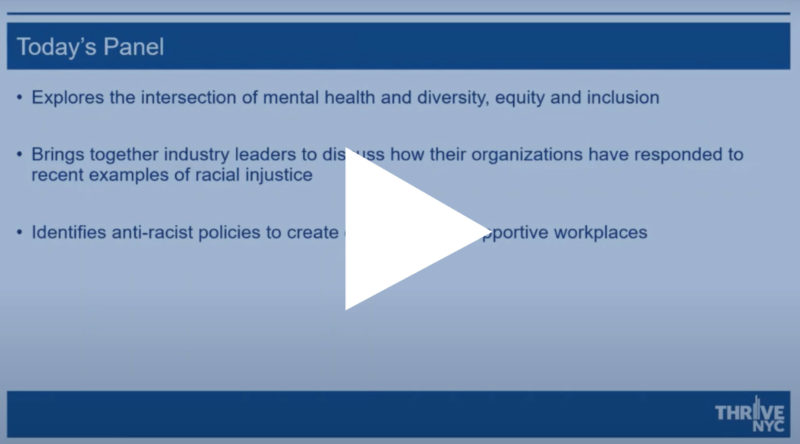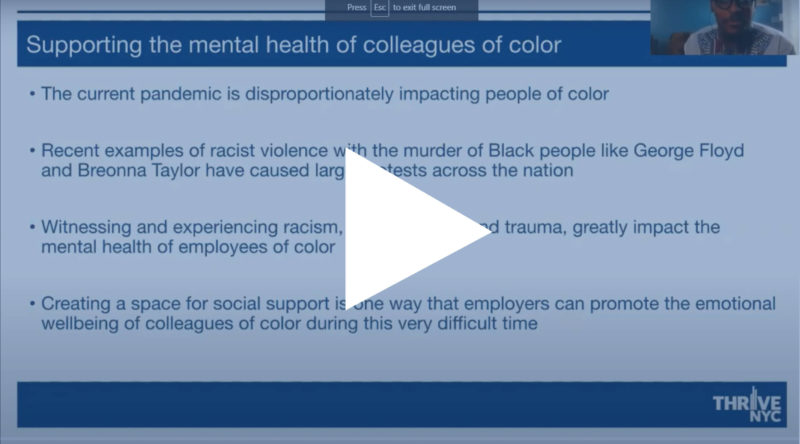Thrive in your Workplace
Overview
Reaching New Yorkers where they are means putting mental health front and center where they live, learn, and work. A part of the Mayor’s Office of Community Mental Health, Thrive in your Workplace (TWP) was a public-private partnership that engaged New York City employers in a place-based effort to bring mental health supports to the 1 in 5 New Yorkers who experience mental illness in a given year. Alongside a national and international groundswell of interest in workplace mental health, local employers that participated in TWP joined a cadre of industry leaders committed to leveraging the workplace to raise awareness and reduce stigma of mental illness; to teaching the critical skills needed to recognize and respond appropriately to mental health challenges; and to promoting their employees’ access to care.
Thrive in your Workplace was a two-year demonstration project that has concluded its active engagement of employers. All of our resources remain free and accessible to any interested employer and we hope they will help to advance your workplace mental health goals.
Our goal
Thrive in your Workplace helped local employers to bring mental health support to the workplace, fostering employee mental health and access to mental health care. Using an evidence-driven assessment and toolkit, TWP helped shape workplace mental health strategy that takes both employee wellbeing and organizational priorities into account, and provided technical assistance to implement workplace mental health programs and policies.
Our results
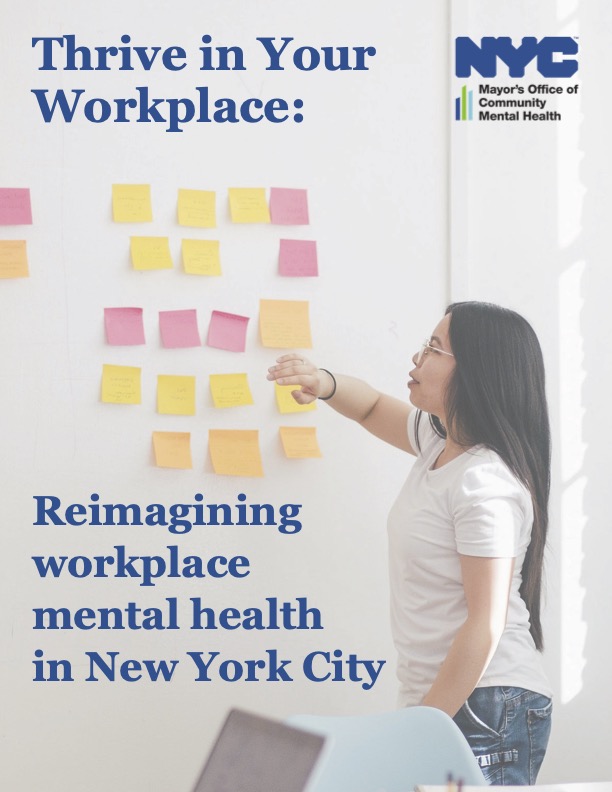 In September 2021, Thrive in Your Workplace published findings about the program’s first two years and key considerations for future workplace mental health efforts in New York City.
In September 2021, Thrive in Your Workplace published findings about the program’s first two years and key considerations for future workplace mental health efforts in New York City.
Our approach
Thrive in your Workplace achieved its goals by providing education about workplace mental health, assessing employers about current practices to offer tailored workplace mental health recommendations, and providing employers with technical assistance to implement new workplace programs and policies.
Thrive in your Workplace’s engagement with employers was highly customized to reflect organizational needs, context, and capacity, and typically spanned 3-6 months:
STEP 1: Employer completed a survey to help us understand workplace mental health practices and goals for employee wellness. Once we had those results, we scheduled a follow-up interview to start shaping strategy.
STEP 2: Employer received a customized workplace mental health recommendation delivered through an on-site presentation and a customized toolkit.
STEP 3: Employer may opt into free technical assistance that included 1:1 consultation with our team and access to webinars.
All employers were included in TWP’s Learning Network, which included receiving a bi-monthly newsletter and ongoing invitations to relevant programming and events.
Workplace assessment: The two-part workplace assessment consisted of a digital survey and in-person interview to determine employers’ organizational needs and priorities as they pertained to workplace mental health, and to inform a tailored recommendation drawn from Thrive in your Workplace’s toolkit. Download a preview of the Thrive in Your Workplace assessment.
Toolkit: The toolkit was developed by conducting a comprehensive literature review of the current evidence base for workplace mental health initiatives, identifying best practices and industry standards, and conducting interviews with experts. The toolkit presents high-quality workplace mental health recommendations, strategies and resources that can guide employers towards creating a mental health friendly workplace to support the emotional needs of their workforce. Download the toolkit.
Evaluation: Employers were expected to participate in a 6-month evaluation survey to measure the performance of their workplace mental health innovation, learn from implementation, and identify and share best practices. Technical assistance was available to support employers in this process.
Why workplaces?
In an increasingly stressful world where people spend most of their waking hours at work, workplace mental health is now more important than ever. In NYC, workers across industries spend more time at work than their counterparts in other cities [“The Hardest Working Cities” Office of New York City Comptroller, March 2015]. While many NYC workplaces are highly productive, their fast pace can come at a cost to workers; they can be stressful in their own right, or even aggravate underlying mental health conditions. Workplace stressors affect all aspects of our lives as they relate to job security and financial stability, interpersonal and relational dynamics, workload and work/life balance, and values, among others.
With clear signs of the social and economic costs of unaddressed mental health issues, both employers and employees are increasingly seeking a comprehensive approach to workplace mental health:
- A Harvard Medical School study found that employees with depression reported the equivalent of 27 missed work days per year.
- A recent study found that nearly 75% workers say they want their employers to champion mental health and well-being in the workplace. 72% of workers ranked mental health and wellbeing above equality (48%), sustainability (38%) and diversity (31%) as a priority.
- 80% of employees treated for mental health problems report improvements in their job satisfaction and productivity.
- From an economic standpoint, a WHO-led study estimated that every $1 invested in prevention and treatment provides a return of $4 in improved health and productivity to the US economy.
Given the opportunity and demand for employers to support the mental health of employees, it is essential for government and industry to leverage the workplace in bringing supports and services to the New Yorkers suffering in silence right now.
What is workplace mental health innovation?
Workplace mental health innovation entails adopting or expanding workplace interventions that transform the ways employees learn about mental health, receive support, or access mental health care. Here are some examples:
Sample: Global corporation
Goal: Increase knowledge of mental health resources and help-seeking behavior
(1) Develop an awareness campaign to reduce stigma
(2) Publicize Employee Assistance Program
(3) Introduce free or subsidized digital mental health resources
Sample: Large non-profit
Goal: Educate workforce about mental illness and build skills
(1) Provide Mental Health First Aid Training at the workplace
(2) Conduct lunch and learns about specific mental health topics
(3) Train managers to appropriately support and refer employees to care
Sample: Medium-sized business
Goal: Facilitate connection to high-quality mental health supports
(1) Assess mental health benefits to determine accessibility and affordability
(2) Conduct reviews of mental health utilization with providers
(3) Create linkage to clinical or tele-health providers
Watch free webinars for a deep dive into workplace mental health topics:
Management & Leadership
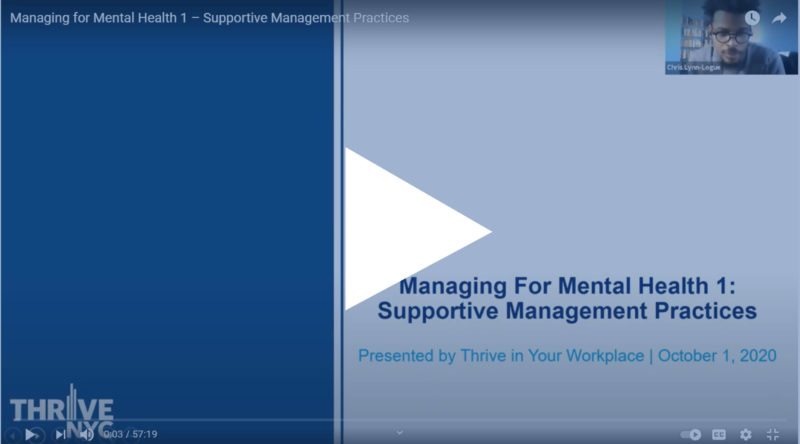 Managing for mental health 1 – Supportive management practices
Managing for mental health 1 – Supportive management practices
This training webinar helps managers understand the value and effectiveness of mental health support in the workplace and provides managers with the skills to support their own and their staff’s mental wellbeing. This is part one of a two-part series. The second training is titled “Managing for Mental Health 2 – Balancing Performance Management & Mental.” Download the PDF of Managing for mental health 1.
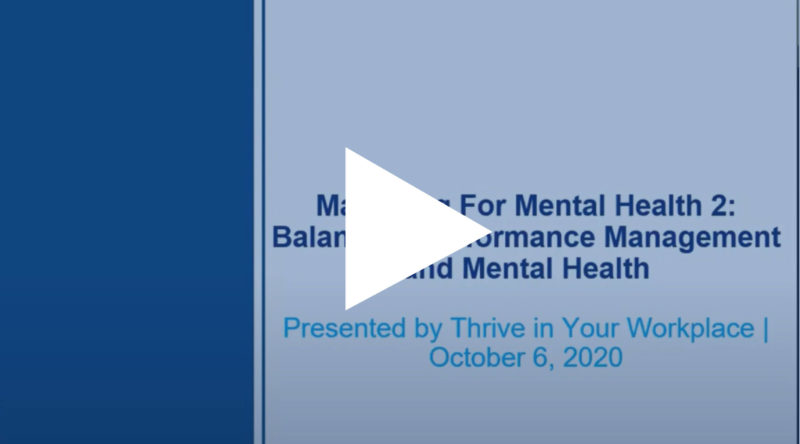 Managing for mental health 2 – Balancing performance management and mental health
Managing for mental health 2 – Balancing performance management and mental health
This training webinar provides managers a general overview of strong performance management systems and best practices for performance management. The training also delves into managing performance for employees who may be experiencing mental health challenges. Download the PDF of Managing for mental health 2.
Building the business case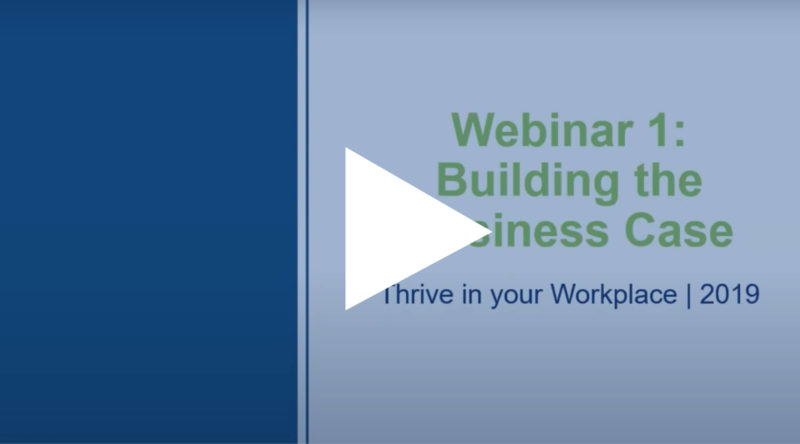
This webinar provides an overview of common mental health issues, their prevalence, and costs to business, and includes guidance on crafting a compelling leadership case to prioritize workplace mental health.
Download the PDF of Building the business case.
Diversity, Equity, Inclusion
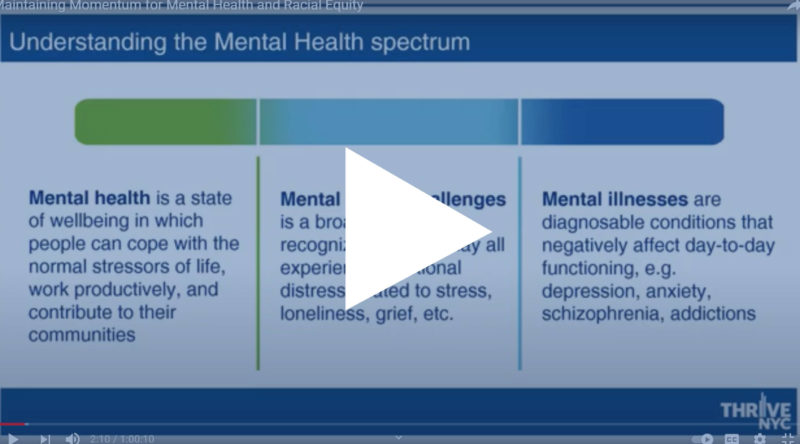 Maintaining momentum for mental health and racial equity
Maintaining momentum for mental health and racial equity
This training explores the relationship between mental health and racial equity. The training helps managers learn strategies to address systemic workplace issues related to Diversity Equity and Inclusion, including the MERIT framework, a tool that organizations can use to promote racial justice and improve workplace mental health. Download the PDF of Maintaining momentum for mental health and racial equity.
How to foster anti-racist workplace practices for mental health
A panel discussion featuring Diversity, Equity and Inclusion leaders and experts, who discussed the anti-racist policies that they are pursuing to create equitable and supportive workplaces. Download the PDF of How to foster anti-racist workplace practices for mental health.
How to support the mental health of colleagues of color
A panel discussion featuring Employee Resource Groups (ERGs) representatives from Wieden Kennedy, Verizon Media, and Wavemaker Global, who shared how their ERGs and workplaces have been supporting the mental health of their colleagues of color, particularly during COVID-19 and the recent protests against racial and social injustice. Download the PDF of Thrive in Your Workplace: How to support the mental health of colleagues of color.
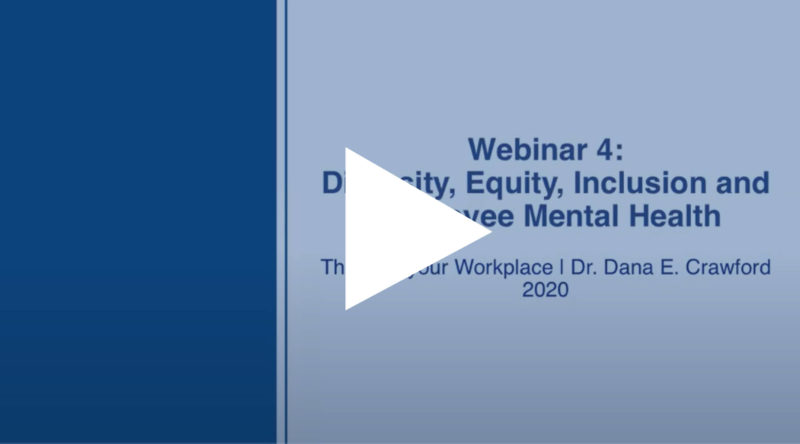 Diversity, equity, inclusion & employee mental health
Diversity, equity, inclusion & employee mental health
This webinar offers an opportunity to go beyond introductory diversity, equity and inclusion concepts by learning about the ways these concepts intersect with workplace mental health. Download the PDF of Diversity, equity, inclusion & employee mental health.
Resiliency and Work/Life Balance
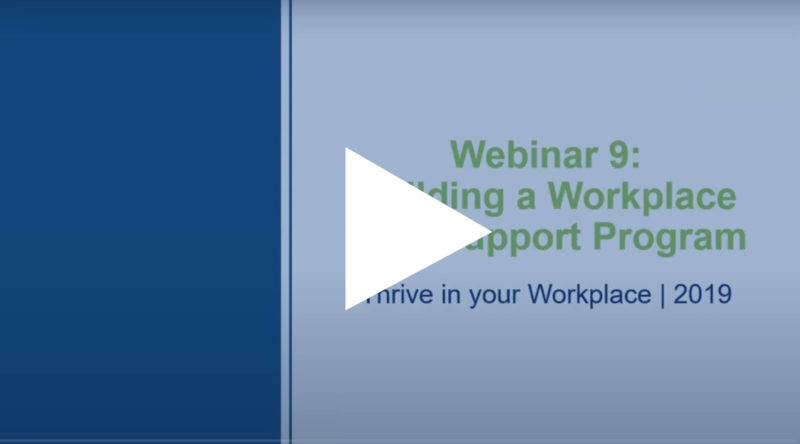 Building a workplace peer support program
Building a workplace peer support program
This webinar describes several different types of peer support models and work and identifies practical strategies to implement a program and case studies. Download the PDF of Building a workplace peer support program.
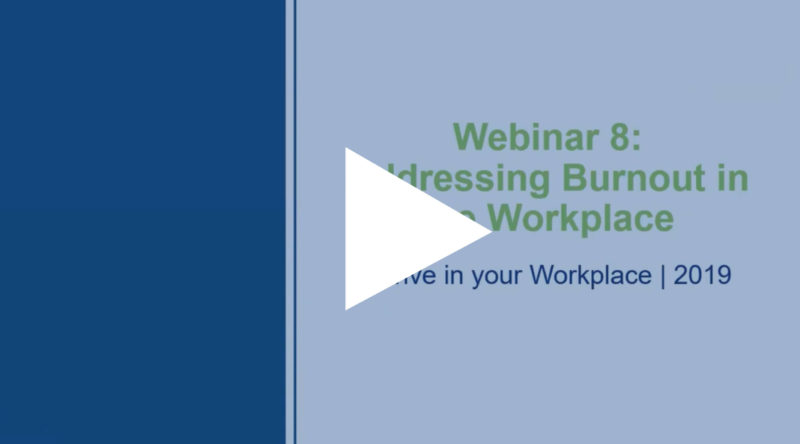 Addressing burnout in the workplace
Addressing burnout in the workplace
This webinar defines burnout and provides descriptions of the six common causes of burnout and how employers can develop strategies to prevent and mitigate burnout. Download PDF of Addressing burnout in the workplace.
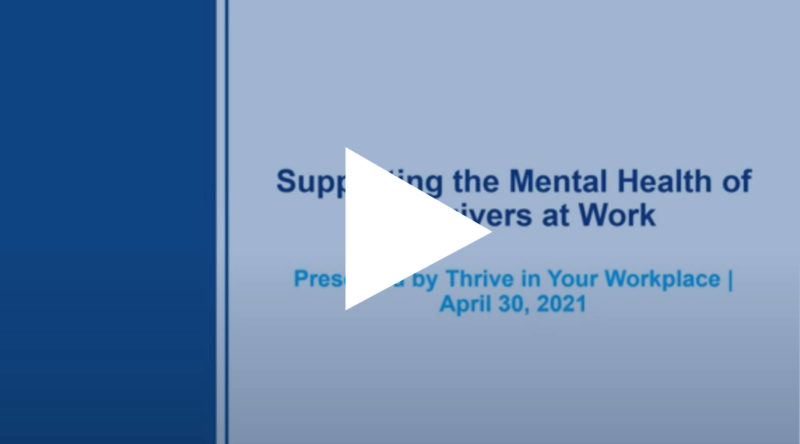 Supporting the mental health of caregivers at work
Supporting the mental health of caregivers at work
Nearly 1 in 6 Americans is a caregiver who spends an average of 20+ hours per week caring for a loved one (AARP report). Caregiving itself can be emotionally taxing and exhausting; and balancing professional responsibilities can exacerbate stress. This training brings together experts to highlight the unique stressors faced by caregivers, presents strategies to support their mental health and that of their loved ones, and provides an overview of caregiver rights in the workplace. Download a guide that shares information about how you can support caregivers in the workplace.
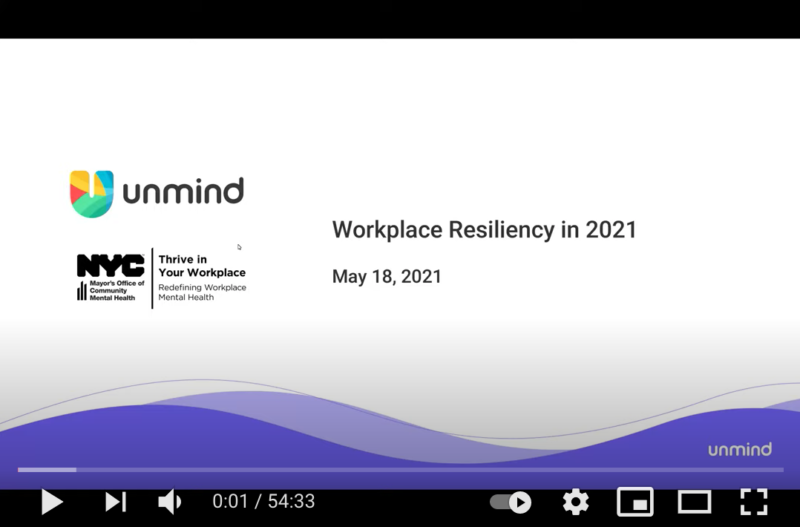 Exploring Workplace Resiliency in 2021
Exploring Workplace Resiliency in 2021
In partnership with Unmind, the workplace mental health platform, this workshop explores workplace resiliency strategies during and following the global pandemic. Together with WELCOA, Unmind released a new research report that illuminates growing concerns on the state of employee wellbeing and resilience as we move through COVID-19. The past 12+ months have given organizations an opportunity to reflect on what “resilience” truly means to them and to employees. Watch the webinar to learn about ways you can promote workplace mental health during the upcoming months.
Trauma
 Creating a vicarious trauma-informed workplace
Creating a vicarious trauma-informed workplace
This webinar provides an overview of vicarious trauma, including individual symptoms and their effect on the workplace, and how employers can use organizational strategies to create a vicarious trauma- informed workplace to support employees who work with victims of trauma. Download the PDF of Vicarious Trauma.
Implementation
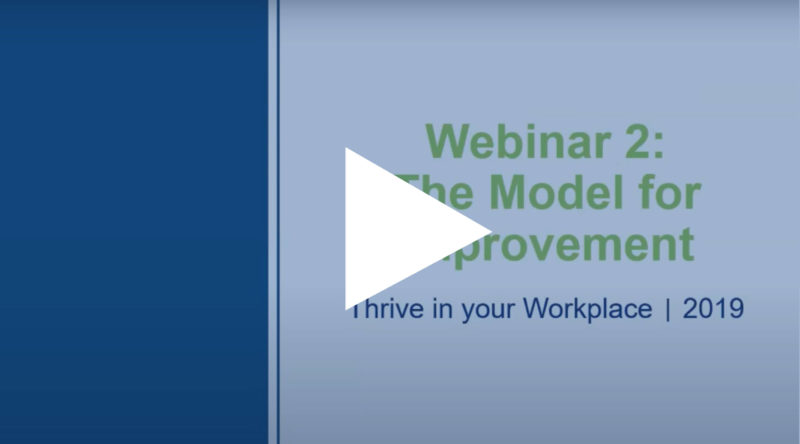 Model for improvement
Model for improvement
This webinar provides an overview of the Model for Improvement, a quality improvement framework, and includes practical suggestions for applying this framework to workplace mental health implementation. Download the PDF of Model for improvement.
Accommodations, risk and compliance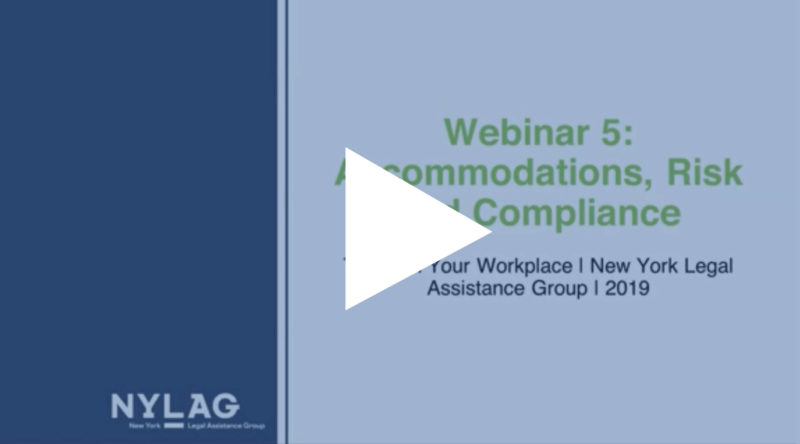
This webinar, provides an overview of Americans with Disabilities Act, and guidance on implementing and ensuring compliance with New York State and New York City laws related to employment and includes recommendations for cross department collaboration to support creating a mental health-friendly workplace. Download the PDF of Accommodations, risk and compliance.
Evaluating your mental health initiative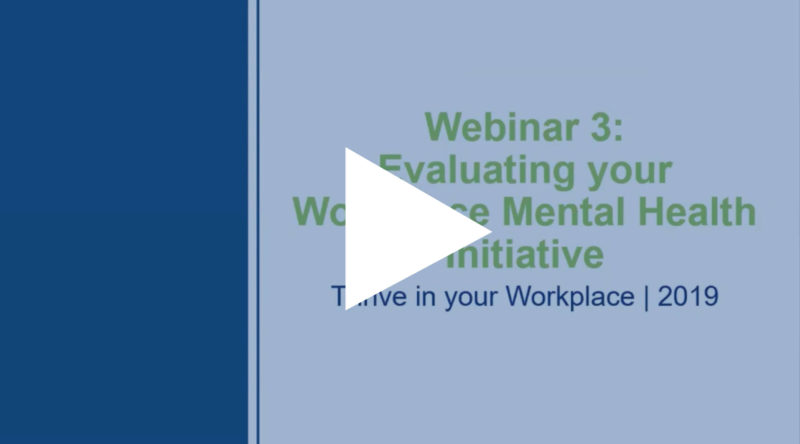
This webinar provides an overview of simple evaluation techniques and the importance of collecting data as part of launching a workplace mental health initiative and includes sample metrics and examples from the field.
Download the PDF of Evaluation.
Offering high-quality mental health benefits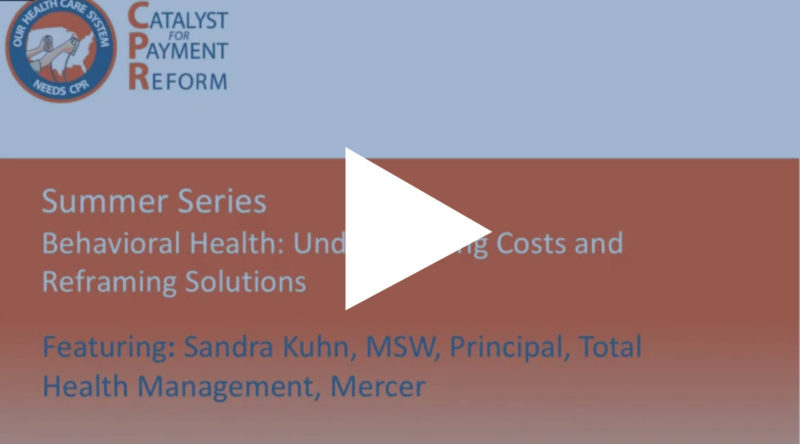
This webinar provides an overview on the future of mental health care, common barriers to access, opportunities for quality improvement and the importance of using an integrated approach for behavioral health. It includes case studies from different organizations about how they are approaching behavioral health benefits. Download the PDF of Offering High Quality Mental Health Benefits.
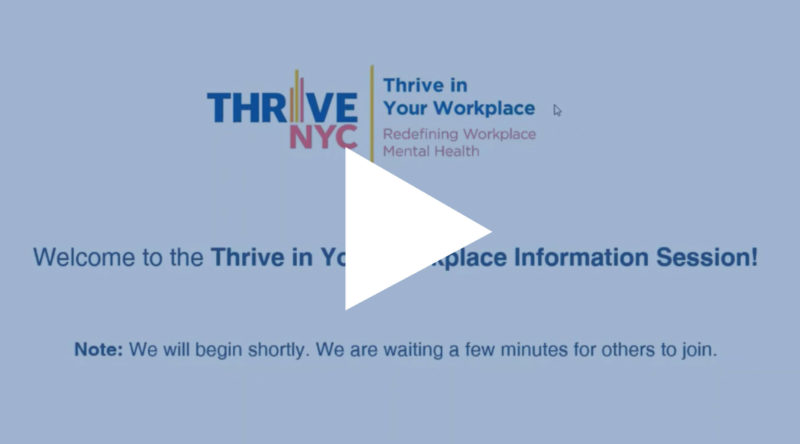 Thrive in Your Workplace information session
Thrive in Your Workplace information session
This information session provides an introduction to workplace mental health and explains the value to employers of formally engaging with Thrive in Your Workplace (TWP)’s free consultation services. Viewers will hear directly from employers The HOPE Program and PwC about their experience working with TWP and how our collaboration has supported their workforce.
COVID-19 Support
Addressing collective trauma from COVID-19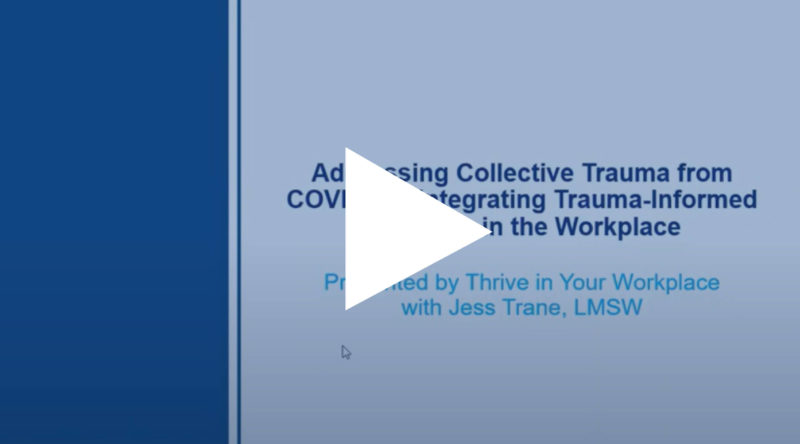
This training describes the impact of collective trauma on workers during the COVID-19 pandemic, provides an overview of trauma-informed practice in the workplace, and concludes with action-oriented recommendations related to safe workspaces, peer support, and management to promote staff mental health. The webinar is delivered in partnership with Jess Trane, LMSW, Assistant Director of Training & Capacity Building at The Door – A Center of Alternatives. Download the PDF of Addressing collective trauma from COVID-19.
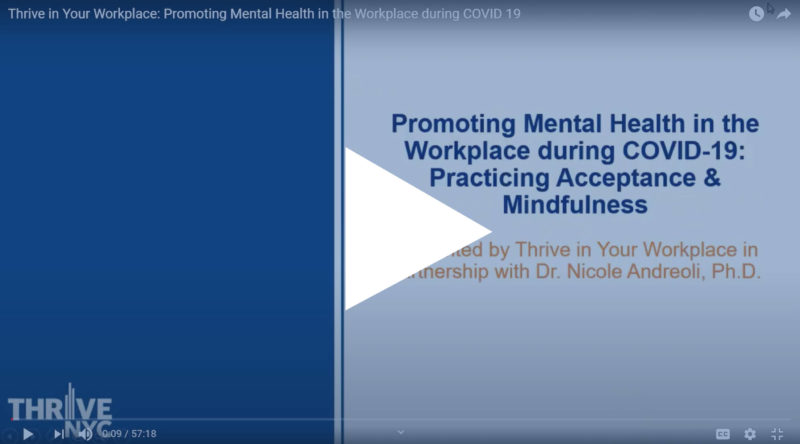 Promoting mental health in the workplace during COVID-19
Promoting mental health in the workplace during COVID-19
This training describes the signs and symptoms of mental health challenges, presents practical strategies to reduce stress and anxiety, and introduces best practices to foster workplace mental health. Download a PDF of Promoting Mental Health in the Workplace during COVID-19 here.
